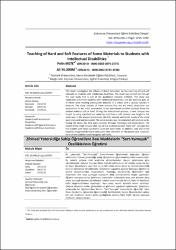Teaching of Hard and Soft Features of Some Materials to Students with Intellectual Disabilities
Abstract
This study investigated the effects of direct instruction on the teaching of hard-soft concepts to students with intellectual disabilities. The study was carried out through the case study that is one of the qualitative research methods. The study was conducted with three students with intellectual disabilities, one boy and two girls, all of whom were meeting prerequisite behavior in a school with a special subclass in Erzurum. The study consists of three sections that are the initial, instruction and assessment. In the initial assessment, it was determined whether students knew the studied material soft or hard. During the instructional process, a hard concept was taught by using specified real materials and then a soft concept was taught in the same way. In the assessment process, the first, second, and fourth weeks of the study were discussed and evaluated. The same process was re-conducted with picture cards. During the study, the data were collected through interviews and observations. The results of the study showed that two of the students learned "hard-soft" concepts but the student with Down syndrome could not learn them. In addition, only one of the students recognized the hard items when they saw them on the picture card. however, none of the students could recognize soft items.


















